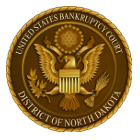FAQs
-
What debts are dischargeable?
All debts are dischargeable except for those listed in 11 United States Code § 523.
-
What documents do I need to start a bankruptcy?
A complete list of the documents and forms necessary to start a bankruptcy case under any chapter of the Bankruptcy Code is listed under the filing requirements section of this web site.
If you need to start your case quickly, you can file only those documents indicated as minimum documents required for filing. All additional documents must be filed within the time indicated. Your failure to timely file additional required documents or seek an extension of time to do so may result in dismissal of your case.
The clerk's office does not supply Official Bankruptcy Forms. However, Official Bankruptcy Forms may be downloaded from this web site under Forms.
A sample Chapter 13 Plan, formulated by a local committee of Chapter 13 bankruptcy practitioners is located on our website under Forms & Filing Info>Sample Chapter 13 Plan. There is no requirement use the sample plan.
Type the information on the forms, if possible.
-
What does it mean if a case is dismissed?
A dismissal order concludes the case. Upon dismissal, the "automatic stay" ends and creditors may start to collect debts, unless a discharge is entered before the dismissal and is not revoked. An order of dismissal itself will not free the debtor from any debt. Often, a case is dismissed when the debtor fails to do something he/she must do (such as show up for the creditor's meeting, or pay the filing fee), or if it is in the best interests of the creditors. Unless the debtor appeals the order or seeks reconsideration of the order within fourteen (14) days after entry of the order, the clerk will automatically close the case.
-
What does the clerk's office do?
The clerk's office provides a variety of services to the bankruptcy judges, attorneys, and the public. The clerk's office staff provides clerical and administrative support to the court by filing and maintaining case-related papers, sending notices, and setting hearings. The services provided by the clerk's office to attorneys and the public include responding to requests for information and making copies of papers in bankruptcy court files.
-
What if I can't afford to pay the full filing fee at this time? Can I pay in installments?
Rule 1006 does allow for the payment of the filing fee in installments. An application to pay filing fee in installments can be filed with the bankruptcy petition and approved by the court. The total number of payments or installments shall not exceed four, and the final installment must be paid within 120 days of the filing of the petition. A first installment of $100 is requested at the time of filing or within 14 days.
-
What is a bankruptcy trustee?
In Chapter 7, 12, and 13 cases and in some Chapter 11 cases, a case trustee is assigned by the court to administer the bankruptcy proceedings.
-
What is a joint petition?
A joint petition is the filing of a single petition by an individual and the individual's spouse. Only people who are married on the filing date may file a joint petition. Unmarried persons, corporations and partnerships must each file a separate case. If you are an individual and have a business which is not a partnership, corporation, or business trust that is a registered entity in a state or foreign country, you should list the business as a "dba" (doing business as) on your petition. However, yours will not be considered a joint petition because the business is not an independently-recognized legal entity.
-
What is a reaffirmation agreement?
A reaffirmation agreement is an agreement by which a bankruptcy debtor becomes legally obligated to pay all or a portion of an otherwise dischargeable debt. Such an agreement must generally be filed within sixty (60) days after the first date set for the meeting of creditors.
Reaffirmation agreements are strictly voluntary. They are not required by the Bankruptcy Code or other state or federal law.
-
What is bankruptcy?
Bankruptcy is a way for people or businesses who owe more money than they can pay right now (a "debtor") to either work out a plan to repay the money over time under Chapter 11, 12 or 13, or for most of the bills to be wiped out ("discharged"), as in a Chapter 7 case. While the debtor is either working out the plan or the trustee is gathering the available assets to sell, the Bankruptcy Code provides that creditors must stop all collection efforts against the debtor. When the bankruptcy petition is filed, you are immediately protected from your creditors.
-
What is redemption?
Redemption allows an individual debtor (not a partnership or a corporation) to keep tangible, personal property intended primarily for personal, family, or household use by paying the holder of a lien on the property the amount of the allowed secured claim on the property, which typically means the value of the property. Otherwise, in order to retain the property, the debtor would have to pay the entire amount of the secured creditor's debt or enter into a reaffirmation agreement and become legally obligated on the debt again. The property redeemed must be claimed as exempt or abandoned.
